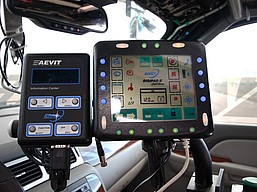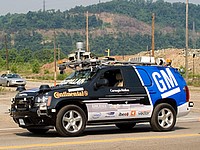Could GM’s Salvation Be Stuff of Science Fiction?
|
|
|
Team Tartan's DARPA entry on the road. Note the empty driver's seat. |
Mired in the gloomy reality of a money-losing present, General Motors Corp. is prepared to spend millions of dollars in pursuit of something long viewed as science fiction: a car that drives itself.
Chairman and Chief Executive Rick Wagoner will outline GM's ambitions tomorrow in a keynote address at the Consumer Electronics Show in Las Vegas as part of a larger effort to change buyers' perceptions of the auto giant. In Mr. Wagoner's vision of the not-too-distant future, vehicles crammed with cameras, sensors, radar and navigation technology will be able to brake and accelerate on their own, avoid accidents and spot congestion. And he's determined to have GM be seen as leading the way.
 |
|
Better than a human? |
"We see vehicles going from being largely mechanical to becoming more and more electronic," Larry Burns, chief technologist at GM and a confidant of Mr. Wagoner's, said in an interview last week. "We can think of no auto maker that is better positioned to fully leverage this trend than us."
Pushing the technological envelope is a key element of Mr. Wagoner's strategy for turning GM around and positioning the company to compete with Toyota Motor Corp. in the long term. He is convinced being the first with game-changing innovations is the solution to one of GM's fundamental problems — its battered image.
In Las Vegas, Mr. Wagoner will show an experimental sport-utility vehicle already capable of driving and navigating on its own. Developed by GM and a team from Carnegie Mellon University, the Tahoe Boss in November competed in a Defense Department competition in which unmanned vehicles had to travel 60 miles through a mock urban environment. It won the $2 million first prize.
Still, the technology is a long way from commercial use, and there's no guarantee GM will be first to offer it. Several other auto makers are also working toward autonomous vehicles. Both Toyota and Volkswagen have experimental vehicles like GM's. Daimler AG, maker of Mercedes-Benz vehicles, now builds trucks with "active brake assist" technology that scans the road ahead for obstacles or slowing vehicles and brakes if the driver is slow to respond. More at Wall Street Journal

